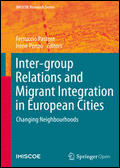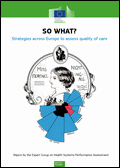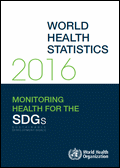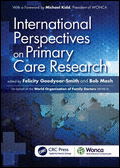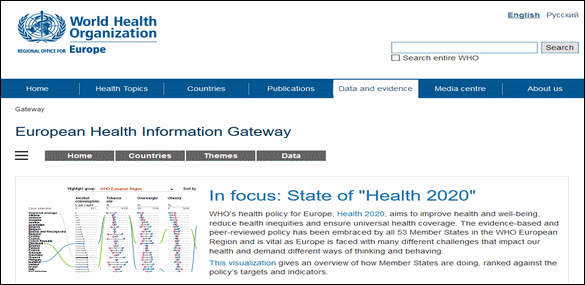 SELECTED FOR YOU... JUNE 2016
SELECTED FOR YOU... JUNE 2016
 books of the month
books of the month
 sites of the month
sites of the month
 watch on health economics
watch on health economics
All the Selected for you
BOOKS
Inter-group Relations and Migrant Integration in European Cities.
sl : Springer Open, 2016
This book presents a comparative analysis of intergroup relations and migrant integration at the neighbourhood level in Europe. Featuring a unique collection of portraits of urban relations between the majority population and immigrant minorities, it examines how relations are structured and evolve in different and increasingly diverse local societies. Inside, readers will find a coordinated set of ethnographic studies conducted in eleven neighbourhoods of five European cities: London, Barcelona, Budapest, Nuremberg, and Turin. The wide-ranging coverage encompasses post-industrial districts struggling to counter decline, vibrant super-diverse areas, and everything in between. Featuring highly contextualised, cross-disciplinary explorations presented within a solid comparative framework, this book considers such questions as: Why does the native-immigrant split become a tense boundary in some neighbourhoods of some European cities but not in others? To what extent are ethnically framed conflicts driven by site-specific factors or instead by broader, exogenous ones? How much does the structure of urban spaces count in fuelling inter-ethnic tensions and what can local policy communities do to prevent this? The answers it provides are based on a multi-layer approach which combines in-depth analysis of intergroup relations with a strong attention towards everyday categorization processes, media representations, and narratives on which local policies are based. Even though the relations between the majority and migrant minorities are a central topic, the volume also offers readers a broader perspective of social and urban transformation in contemporary urban settings. It provides insightful research on migration and urban studies as well as social dynamics that scholars and students around the world will find relevant. In addition, policy makers will find evidence-based and practically relevant lessons for the governance of increasingly diverse and mobile societies (résumé de l'éditeur).
So What? Strategies across Europe to assess quality of care.
European Commission. Bruxelles. INT
Luxembourg : Publications Office of the European Union, 2016/04
Today, the expert group on health systems performance assessment (HSPA) composed of European countries health authorities and international organisations, and co-chaired by Sweden and the Commission, publishes its first report.The HSPA expert group, set up in 2014, provides participating countries with a forum to exchange experience on the use of HSPA at national level. It also aims to support national policy-makers by identifying tools and methodologies for developing HSPA. The overarching aim of this work is to build better health systems that help people remain healthy and ensure access to good quality healthcare for those in need. This first report focuses on quality of care. It is based on the exchange of experiences and knowledge among countries and with international organisations between 2014 and 2015. It sets out a selection of country cases, analyses them and draws general conclusions.
World Health Statistics 2016: Monitoring health for the SDGs.
Organisation Mondiale de la Santé. (O.M.S.). Genève. CHE
Genève : OMS, 2016
The World Health Statistics series is WHO's annual compilation of health statistics for its 194 Member States. This report 2016 focuses on the proposed health and health-related Sustainable Development Goals (SDGs) and associated targets. It represents an initial effort to bring together available data on SDG health and health-related indicators. In the current absence of official goal-level indicators, summary measures of health such as (healthy) life expectancy are used to provide a general assessment of the situation.
International Perspectives on Primary Care Research.
Goodyear-Smith F. / éd., Mash B. / éd.
Londres : CRC Press, 2016
This book examines how the evidence base from primary care research can strengthen health care services and delivery, tackle the growing burden of disease, improve quality and safety, and increase a person-centred focus to health care. Demonstrating the inter-professional nature of the discipline, the book also features a section on crossnation organisations and primary care networks supporting research. National perspectives are offered from researchers in 20 countries that form part of the World Organization of Family Doctors, providing case histories from research-rich to resource-poor nations that illustrate the range of research development and capacity building. This book argues the importance of primary care research, especially to policy makers, decision makers and funders in informing best practice, training primary health care providers and achieving equitable distribution of care.
SITES
European Health Information Gateway
http://portal.euro.who.int/en
Presentation
Ce portail européen d'information sanitaire de l'Oms s'adresse au grand public. Il fournit des données et informations sous un format facilitant leur compréhension, leur comparaison et leur extraction. Il comprend une section interactive, actuellement composée d'ensembles de données et de profils de pays issus du cadre de suivi de Santé 2020 et des enquêtes sur le comportement des enfants d'âge scolaire en matière de santé (HBSC). Il est également une porte d'accès aux bases de données statistique de l'OMS. La recherche peut se faire également par thèmes ou par pays.
